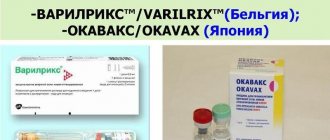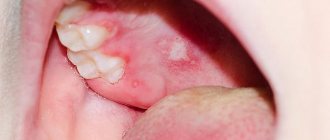Herpesvirus infections are a group of infectious diseases that are caused by viruses from the Herpesviridae family, can occur in the form of localized, generalized, recurrent forms of the disease, and have the ability to persist (the virus is constantly present) in the human body.
Herpesvirus infections (HVI) are among the most common human viral diseases. Their infection and morbidity rates are increasing every year. In all countries of the world, 60-90% of the population is infected with one or another herpes virus.
Types of herpes in infants
For babies in the first year of life, herpes comes in different types. The forms in which the herpes virus manifests itself are as follows:
- generalized;
- neurological herpes in newborns;
- localized.
In the first case, the generalized form of herpes in infants has the following clinical picture. The virus affected the internal organs and led to intoxication. The baby has difficulty breathing, he may vomit and belch, and the fever can sometimes be very strong.
With the neurological form of herpes, the virus spreads its influence to the nervous system and brain. If the infection occurred in utero, the child may have the following deviations from normal development: microcephaly, hydrocephalus, and the formation of calcifications. Symptoms here vary and are not always typical. The newborn baby appears lethargic or cries incessantly. In addition, the baby may experience a swollen fontanelle and convulsions. Localized herpes in infants. The virus appears in limited places on the child's body. These are the eyes, nasolabial area, etc.
In addition, herpes can be primary or secondary. Primary herpes in newborns can be a consequence of infection of the baby's mother during pregnancy. In addition to transmission of the virus through the placenta, the infection can be transmitted to the fetus during childbirth, when the baby passes through the birth canal. The method of entry of the herpes virus can also be domestic. A baby can become infected with the disease through the belongings of other children or through airborne droplets, as well as from parents.
How does secondary herpes develop? When an infection has entered the body of a newborn, it may not immediately manifest itself. The virus is suppressed by antibodies that the baby's mother transmits to him along with milk during breastfeeding. If the baby’s immune defense decreases, the herpes virus will be activated. In this case, the infection will spread throughout the body, approaching the skin and mucous membranes; visual manifestations of herpes will be visible as a specific rash.
The worst thing is if herpes in infants occurs on the genitals. In this case, the virus can infect the bladder and ureter. Also, such herpes, and it is called genital, can affect important internal organs, including the heart.
Enteroviral stomatitis
Enteroviral stomatitis (hand-foot-mouth syndrome) is also characterized by the formation of painful aphthae on the tongue, under the tongue, on the mucous membranes of the cheeks and lips, on the soft palate and at the base of the gums. Accompanied by a blistering rash around the mouth, on the palms, back of the hands, feet, back of the thighs and buttocks of the child, fever, sore throat, headache, loss of appetite.
The causative agents of enteroviral stomatitis are the Coxsackie virus and other enteroviruses. The disease is very common among young children in the summer and is transmitted through contact with an infected person through the airborne or fecal-oral route: through dishes, hygiene items, bedding, toys.
The incubation period (from infection to the onset of symptoms) is 3 to 6 days. Fever is often the first sign of illness. Painful aphthae in the mouth appear 1–2 days after the onset of fever, then rashes are observed on the arms, legs and buttocks. Enteroviral stomatitis does not require special treatment, all signs and symptoms of the disease usually disappear after a week, and the child’s condition returns to normal.
Symptoms and localization of herpes in infants
Manifestations of herpes can be in different places of the newborn’s body. Depending on what type of herpes virus infected the baby, the distribution of manifestations will be different. So, we will tell you the symptoms in each case in order.
Simple herpesvirus type 1. The manifestation of infection on the lips of the newborn, as well as in the nasolabial area. The rashes are filled with liquid and are small in size. The liquid becomes cloudy over time, and the so-called blisters burst. In place of the burst blisters, wounds appear, which disappear after a while.
The second type, genital. Localization area: genitals, anus. The rashes are small and filled with liquid. The affected area itches and burns. There is also discomfort when emptying the bladder. Lymph nodes enlarge.
The third type is called chickenpox. The rash covers the entire body. They are present not only on the skin, but also on the mucous membranes. This herpes in infants is characterized by an increase in body temperature, the child looks lethargic and weak.
Herpesvirus type 4. If the form is uncomplicated, then there are no symptoms. With the development of infectious mononucleosis, the tonsils and palate are affected. The virus can infect the spleen and liver, and the composition of the blood changes. Symptoms: general malaise, apathy, weakness. In addition, the child has a stuffy nose, a sore and red throat. Lymph nodes become larger in size. The rashes are pinpointed, they look like tiny hemorrhages or pink blisters on swollen skin.
Fifth type. In most cases there are no symptoms. However, there are also characteristic manifestations of this type of herpes in a child. With cytomegalovirus mononucleosis, intoxication of the body begins. This is expressed in a sharp rise in temperature to 39 degrees, a sore throat, and the nasopharyngeal mucosa is red. In difficult cases, infants have pain when swallowing. The child has difficulty breathing, hearing partially or completely disappears. Sometimes internal organs are damaged.
Virus type six. Increased temperature, changes in lymph nodes. The rash is papular-spotty, pink in color. This herpesvirus can cause immunodeficiency in children.
Infectious mononucleosis
Another disease of viral etiology with severe “cold” symptoms. The main causative agent of infectious mononucleosis is the Epstein-Barr virus (rarely other viruses). The infection spreads through saliva.
The disease is typical for adolescents and young adults (the so-called “kissing disease”), but young children can also become infected with infectious mononucleosis through contact with objects touched by an infected person (for example, through dishes). Most adults already have antibodies to IM because they have been exposed to the infection, so they are immune and do not get sick. In people with a weakened immune system due to concomitant pathologies or organ transplantation, MI can cause serious complications and other diseases (anemia, meningitis, encephalitis, myocarditis, etc.).
Symptoms of MI appear approximately 4–6 weeks after infection and may develop slowly and not all at the same time. They include severe sore throat, weakness, fatigue, fever, loss of appetite, enlarged neck and axillary lymph nodes, inflammation of the tonsils with white plaque, headache, muscle pain, skin rashes, abdominal pain, enlarged spleen or liver.
Most patients recover within 2–4 weeks of onset of symptoms, but some continue to experience symptoms of MI (eg, fatigue, enlarged lymph nodes, splenomegaly, hepatomegaly) for several weeks or even months.
The disease is diagnosed based on symptoms, their duration and specificity, as well as a physical examination. A blood test for antibodies to the Epstein-Barr virus and a general blood test to determine the level of leukocytes (prescribed if necessary) help confirm the diagnosis.
The symptoms of MI are quite unpleasant and cause significant discomfort to the patient, but the disease goes away on its own, without treatment or any consequences. Drinking plenty of fluids, rest and a healthy diet are recommended. To relieve symptoms (sore throat, headache, muscle pain, fever), it is recommended to use paracetamol or ibuprofen, or gargle with salt water. The addition of a secondary infection (streptococcal, for example) requires the use of antibacterial drugs. If the airways are severely narrowed and there is difficulty breathing, corticosteroids may be prescribed. To reduce the risk of rupture of the capsule of an enlarged spleen or liver, it is recommended to avoid exercise, heavy lifting, and contact sports for at least a month, or until the liver and spleen return to normal size.
When to see a doctor
With a primary infection, the child almost always develops a fever. The baby has no appetite, anxiety, crying, and sleep disturbances. If one of the above symptoms is present or if there are several of them, you need to immediately show the newborn to a specialist - a pediatrician (children's doctor) or a dermatovenerologist.
If the infection develops, it can lead to complications, including death. The herpes virus in newborns should be identified as quickly as possible so that treatment can begin without delay. If there are signs of herpes in an infant, you can visit JSC “Medicine” (academician Roitberg’s clinic) in the center of Moscow. The Pediatrics Department has a staff of highly qualified specialists, new generation equipment and instruments for examination. You can make an appointment with a pediatrician or dermatovenerologist on the website or by calling +7(495)993-00-33.
Diagnostics
Herpes has been detected in a child - what to do? You need to undergo examination at a clinic to detect the virus in the body. Diagnostic measures are as follows:
- blood tests - general and chemical;
- taking a smear from the mucous membranes;
- collecting liquid from the cavity of the bubbles;
- scrapings at the affected areas;
PCR is also used to identify the type of herpes virus. If a clinic specialist suspects that the child has damage to the liver, spleen, nervous system and other internal organs, you will be prescribed an MRI, CT scan and ultrasound.
About the disease
Herpetic infection is a collective concept that is used to refer to diseases that are provoked by different types of the virus of the same name.
Traditionally, in pediatric practice, pathology caused by type 1 is encountered. This is the so-called labial herpes (rash on the lips). Its peculiarity is its chronic course. It is impossible to completely get rid of the pathogen. With adequate treatment of a child with symptoms of labial herpes, stable remission can be achieved. However, at this time the virus “hides” in the nerve ganglia (ganglia), where it can remain inactive for as long as desired. When favorable conditions arise (primarily decreased appetite), it is activated again. Another common form of herpes infection that can occur in children is varicella (chickenpox). The disease is provoked by the herpes virus type 3. It is important to remember that after successful recovery, the pathogen also goes into a latent form and persists in the nerve ganglia. The risk for the patient may be a reoccurrence of the infection. The type 3 virus, when reactivated, can cause herpes zoster, which is characterized by a more pronounced clinical picture with a deterioration in the child’s well-being and the appearance of rashes along the intercostal nerves.
The specialists of the SM-Doctor clinic have extensive experience in early diagnosis and treatment of all pathologies caused by herpes viruses. Doctors provide the necessary monitoring and quality treatment for children with any form of herpetic infection.
Treatment
If herpes is detected in a child, the following treatment is prescribed. These are antiviral drugs (tablets and ointments), immunostimulants, and interferons are also prescribed. The method of use - tablets, ointments or even injections - is determined exclusively by the attending physician. The dosage is prescribed individually for each little patient. Self-medication in this case is extremely dangerous and can lead to tragic consequences. You must strictly follow all doctor's instructions to avoid further complications.
Let's talk in detail about medications that can be prescribed to infants:
- drugs to suppress infection;
- immunomodulators and immunostimulants;
- antipyretics and pain relievers (suppositories, suspensions);
- antihistamines;
- antiseptics;
- antibacterial agents if microbial infections have joined the virus;
- To heal and dry wounds and ulcers on the body, brilliant green and sulfur-based ointments are prescribed.
Also, if a child has symptoms such as convulsions due to herpes, then anticonvulsant medications are prescribed. To relieve itching on a child's skin, decoctions of medicinal herbs are used. This is chamomile, calendula. You can also use rosehip oil, etc. Such products will not only remove discomfort on the skin where there is a rash, but will also help the wounds heal faster and relieve inflammation.
The baby needs to drink plenty of fluids. If a mother feeds her baby with breast milk, then she needs a balanced and proper diet. You should consume foods rich in vitamins and microelements. As auxiliary measures, isolation of the newborn from contact with strangers and maintaining the personal hygiene of mother and baby at a high level are used. Care must also be taken to ensure that the baby does not scratch the affected areas. To do this, use clothes that cover the baby's fingers. It is sold in special stores for newborns. They also use so-called scratch pads, hand pads, etc.
Complications of herpes in infants
What are the complications of herpes in a child? In infants, herpes can be complicated by the following types of diseases:
- the cardiovascular system is affected;
- cerebral palsy;
- paralysis;
- disturbance in the hematopoietic process;
- encephalitis;
- herpes eyes;
- meningitis;
- hepatitis;
- eczema Galoshes.
To prevent the development or occurrence of the disease, it is worth making sure that the baby’s immune defense is at a high level. It is necessary to carry out hardening procedures and ensure that the child spends enough time in the fresh air. It is important to maintain a certain temperature and humidity in the nursery.
During the prenatal period, expectant mothers need to be screened for the herpes virus. Pregnant women should also take precautions to avoid infection. For example, do not communicate with people who carry this virus, do not use their things, etc.










